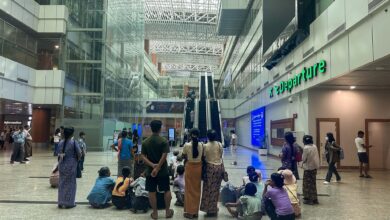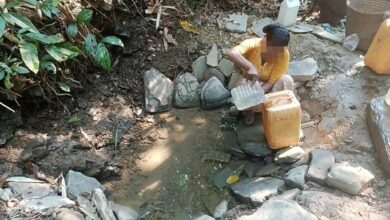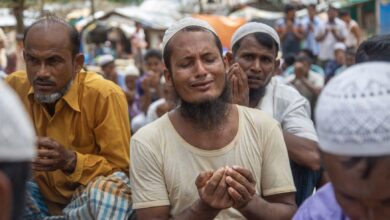
Nway Oo* is not the sort of person you would expect to see at a training camp for young revolutionaries in Myanmar’s central heartland. But that is where the 50-something street vendor (whose nom de guerre means Spring, after the Spring Revolution) was last winter, jogging before dawn and learning how to shoot light weapons alongside her much younger comrades.
It took her two days of travel, by bus and on foot, to reach this resistance base in Magway Region’s Myothit Township. Located some 80km northwest of the junta’s capital Naypyitaw, the township is one of 13 where allied resistance forces formed the Magway Division Army in late July 2021, less than six months after the military seized power.
There are many anti-regime People’s Defence Force (PDF) camps throughout Magway Region, but Nway Oo chose the one run by Myothit Township PDF Battalion 901 for a reason: this was where her 19-year-old son Sat Kalay* was stationed.
Sat Kalay was not at the camp when his mother arrived. At the time, he was attending a military parade by an allied armed group. But when he returned and saw her standing in front of his bunkhouse, he immediately forgot that he was, by now, already a seasoned warrior.
“I heard just before I got back that she was there. And when I saw her, I ran straight up the hill to the camp—something I had never been able to do before. Many of my friends and comrades were standing nearby, but I just couldn’t control myself. I ran up to her, hugged her, and cried,” he said.

‘What was I doing with my life?’
This was more than a year after Sat Kalay left home to join the resistance. He and his mother both took part in protests against the February 2021 coup, but when the military started opening fire on peaceful crowds gathered to demand that it respect the results of the previous year’s election, the young man—then barely turned 18—decided that it was time to take more drastic action.
It was a common story in many parts of the country, as a younger generation that had come of age in an era of relative freedom fought back hard against the military’s efforts to restore its absolute supremacy. What made Sat Kalay’s case unique, however, was his mother’s determination to join him in taking up arms against the regime.
But fearing for his mother’s health and safety, Sat Kalay insisted on going alone. This was hard on Nway Oo, who had lost another son three years earlier, but she didn’t try to defy his wishes.
Still, she couldn’t quite accept that younger people were giving their lives to finally break the military’s stranglehold on power, while she was left trying to eke out an existence in Myanmar’s shattered economy. And so, more than a year later and against her son’s wishes, she abandoned her business and went off to become a member of the resistance.
“I asked myself what I was doing with my life as they were sacrificing their lives and happiness for the cause. So I decided to follow my son and fight alongside him until we win the revolution,” she said.

An agonising decision
It turned out that Nway Oo wasn’t the first mother to reach the Battalion 901 camp. Another woman, some 20 years her junior, was already there when she arrived.
“Sophia,” as she has called herself since leaving behind her former life as an assistant lecturer at an agricultural college, came to the camp with her husband about six months after the coup.
Initially, she took part in the CDM—the non-violent civil disobedience movement against military rule. But as more and more protesters, including many women in the prime of their lives, were murdered by the regime in cold blood, she, too, decided that she had to do more to end its brutal rule.
As it happened, her brother was the commander of Battalion 901. That gave her a clear path to a role on the frontlines of the conflict as an emergency medic for resistance fighters injured in battle.
It wasn’t easy, however, for her to take this leap. The fear of danger didn’t deter her from doing what she felt needed to be done, but the knowledge that it would mean parting from her children, perhaps permanently, made it an agonising decision.
Her son was nine years old when Sophia and her husband left him and his baby sister with relatives. That was nearly two years ago, and both would have grown considerably since then.
“I haven’t heard their voices for almost two years now. I left my daughter when she was just two years old, and sometimes I wonder if she would even recognise us,” she said tearfully.
It was also painful to think of her parents. Her mother died last year, and her 75-year-old father is now in prison for allegedly supporting his children’s fight against the regime.
Even the fact that he had run as a candidate for the pro-military National Unity Party in the 2020 elections did nothing to protect him, said Sophia, who noted that it is standard practice for the junta to punish its opponents by persecuting their loved ones.

Fighting to win
Sat Kalay was not the only one who welcomed Nway Oo’s arrival at the Battalion 901 camp. Others were also pleased, and soon began addressing her respectfully as “Amay,” or mother, perhaps out of homesickness for the lives they had left behind.
“It was a blessing. It was like my own mother had arrived,” said Sophia, recalling Nway Oo’s sudden appearance at the base late last year.
For her part, Nway Oo felt both happy and sad to be there among these young people fighting to liberate their country. She was glad to be able to support them in any way she could, but also saddened to see them living in such hardship, when they should have been pursuing other dreams and ambitions at this stage of their lives.
Sat Kalay was unable to talk his mother out of doing the physically demanding basic training that all new recruits had to undergo, but he balked at allowing her to become a combat-ready resistance fighter.
Suffering from rheumatoid arthritis and a heart condition, Nway Oo was assigned to manage the camp’s kitchen, where she has tried to ensure that everyone is as well fed as possible. Most meals consist of little more than rice and vegetables, but when donations allow, she also adds some meat to the spartan diets of those who rely on her for their sustenance.

When she isn’t cooking, Nway Oo is busy doing whatever she can to make life in the camp more bearable. This even includes leading Buddhist chants in the evenings to help her young charges maintain their mental stability in the midst of so much suffering.
While the resistance forces are now far better equipped than they were when they started their struggle, they are still vastly outgunned by the military, which also shows no compunction about killing civilians. This means that sudden and brutal deaths are a constant threat.
But even this thought has done nothing to diminish Nway Oo’s determination to fight through the pain that she and her new extended family must deal with on a daily basis.
“I don’t care how hard it is, because I have already given my life. I will face everything and fight to win,” she said.
*The names of all sources who spoke to Myanmar Now for this story have been changed for their protection.



